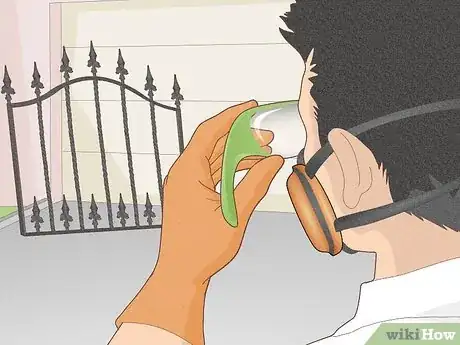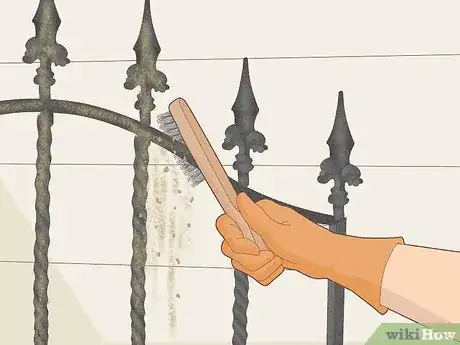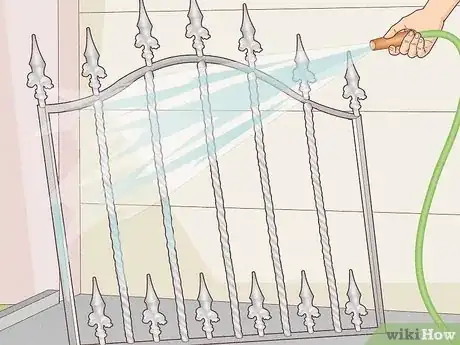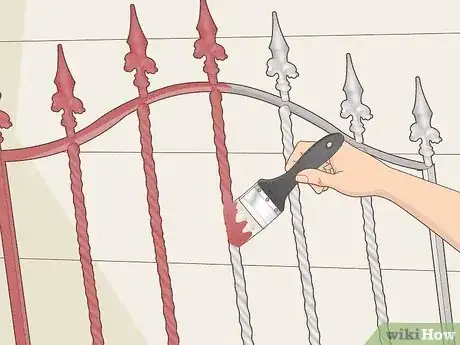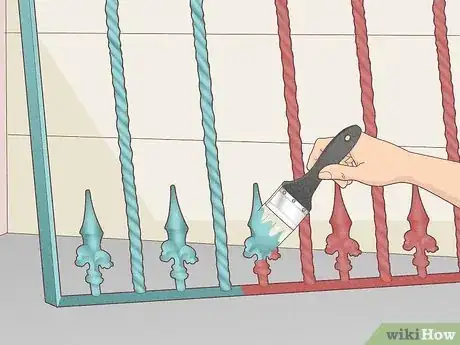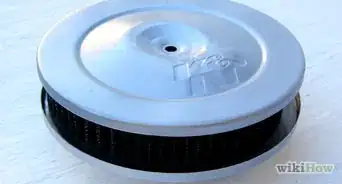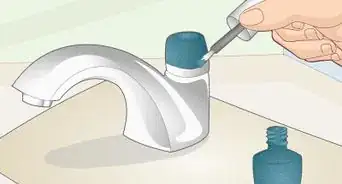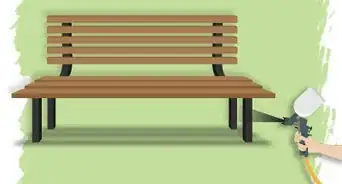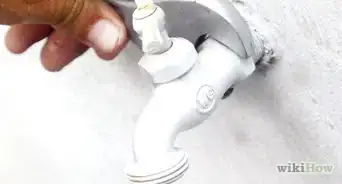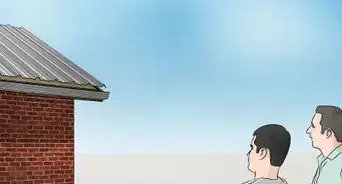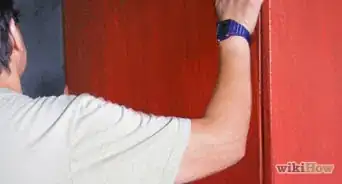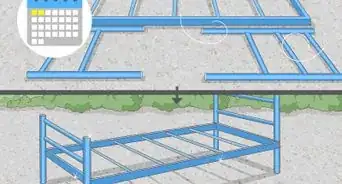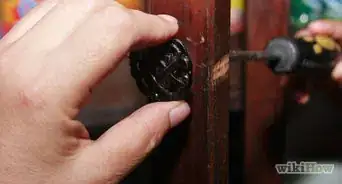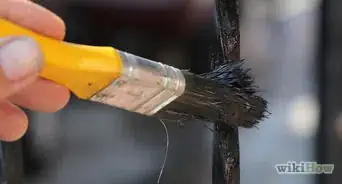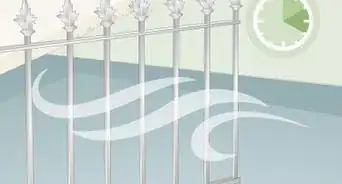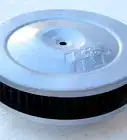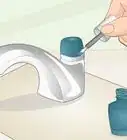This article was co-authored by Andre Kazimierski and by wikiHow staff writer, Sophia Latorre. Andre Kazimierski is a Painting Specialist and the Founder and CEO of Improovy, an on-demand house painting service startup. With more than 15 years of experience, Andre and the Improovy team use data and technology to streamline the home improvement process for homeowners and painting contractors. Andre started in the painting industry as a sophomore at Depaul University in Chicago, working with one of the nation’s largest painting companies to launch new cities and territories across the Midwest. Years later, he started 3rd Gen Painting and Remodeling and had a successful exit after growing the company to two different states.
There are 12 references cited in this article, which can be found at the bottom of the page.
wikiHow marks an article as reader-approved once it receives enough positive feedback. In this case, 93% of readers who voted found the article helpful, earning it our reader-approved status.
This article has been viewed 261,366 times.
Do you have a cast-iron or wrought-iron railing, gate, or fence that’s seen better days? It’s easy to transform that rusty old metal so it looks brand-new with a few simple steps. Though cast iron and wrought iron are produced differently, they’re both susceptible to rust and can be painted the same way.[1] We’ll show you how to prep the metal, walk you through the priming process, and tell you the best paint for cast iron. Read on for our complete guide to painting cast iron easily at home.
Steps
Prepping Your Cast Iron
-
1Work outside and put on safety gear. With all the chemicals and paints you’ll be using plus the sanding and rust you might have to deal with, a well-ventilated space is a must. To protect yourself, wear chemical-resistant gloves, eye protection, and a respirator when using solvents, sanding, or painting.[2]
- If you can't work outdoors, open up your windows and turn on fans to ventilate the space.
- Some old cast-iron fences or gates might be coated with lead paint. Wear protective gear and wash your hands after touching it to protect yourself.
-
2Clean the cast iron with a damp cloth. Wipe down the metal to remove any dirt, dust, or debris. For larger pieces of cast iron, you can spray the metal with water, but you’ll have to let it dry before you move on to the next step. If the cast iron is very dirty or stained, wipe it down with a rag dipped in mineral spirits.[3]
- Be sure to wear gloves, goggles, and a respirator when using mineral spirits on cast iron.[4]
Advertisement -
3Remove rust from the cast iron with a wire brush.[5] It’s essential to remove the rust so the paint will stick to the metal. Put on gloves, goggles, and a respirator to protect yourself. Then use a wire brush to scrub off the rust. This part can take some time, but just keep at it—it’ll be worth it in the long run.[6]
- To make quick work of rust removal, use a wire brush attachment on a cordless drill.[7]
- You can also use a sandblaster or rust-removing chemical product instead. However, these options are more likely to damage the cast iron and are best left to professionals.
-
4Sand the cast iron to remove existing paint.[8] Sanding is especially important if the paint is glossy—you’ve got to get rid of it for another coat of paint to stick. Go over the metal with coarse sandpaper before moving to fine-grit sandpaper. A wire brush or wheel can also work to remove paint.[9]
- For stubborn paint, try 40- to 50-grit sandpaper. To smooth out the metal, finish with 120- to 220-grit sandpaper.[10]
- Make sure you wear a respirator, eye protection, and gloves when sanding away any rust or paint.
-
5Rinse the cast iron and let it dry. Take a hose and spray down the metal to remove any remaining rust, paint flakes, or dust. If you’re working with a smaller piece of cast iron, you can wipe it down with a damp rag, instead. Give the metal time to dry completely before you move on to priming and painting.[11]
Priming and Painting Cast Iron
-
1Coat the cast iron with oil-based primer. Priming the metal creates a smooth surface and will help the paint adhere. Choose an oil-based primer designed for use on metal that contains a rust-inhibitor.[12] Take your time and make sure you cover the entire surface in a light, even coat.[13]
- Mask any areas you don’t want to paint and lay down plastic or dropcloths beneath and surrounding the cast iron item to protect the surroundings from overspray.
- To spray on the primer, shake the can vigorously and then apply the primer in sweeping side-to-side motions.
- Alternatively, use a paintbrush or thick-napped roller to apply the primer to the cast iron.
-
2Let the primer dry completely. This can take anywhere from 2 to 24 hours and is a very important step. If you try to apply paint before the primer is dry, you could pull the paint off the surface with your brush or roller.[14]
-
3Apply oil-based paint to the cast iron.[15] Use the same technique you used with the primer. Either spray paint the metal in even, overlapping strokes or use a brush or thick-napped roller to apply the paint.[16]
- If you’re painting a railing or ornate object, use a small brush to push the paint into the nooks and crannies.
-
4Paint the cast iron with a second coat once it’s dry.[17] Allow the first coat of paint to dry completely before applying the second one.[18] This can take as long as 24 hours, depending on the paint. After you finish your second coat, you’re done! Simply let the paint cure and enjoy your revitalized cast iron.
Expert Q&A
-
QuestionWhat is the best way to paint pipes?
 Andre KazimierskiAndre Kazimierski is a Painting Specialist and the Founder and CEO of Improovy, an on-demand house painting service startup. With more than 15 years of experience, Andre and the Improovy team use data and technology to streamline the home improvement process for homeowners and painting contractors. Andre started in the painting industry as a sophomore at Depaul University in Chicago, working with one of the nation’s largest painting companies to launch new cities and territories across the Midwest. Years later, he started 3rd Gen Painting and Remodeling and had a successful exit after growing the company to two different states.
Andre KazimierskiAndre Kazimierski is a Painting Specialist and the Founder and CEO of Improovy, an on-demand house painting service startup. With more than 15 years of experience, Andre and the Improovy team use data and technology to streamline the home improvement process for homeowners and painting contractors. Andre started in the painting industry as a sophomore at Depaul University in Chicago, working with one of the nation’s largest painting companies to launch new cities and territories across the Midwest. Years later, he started 3rd Gen Painting and Remodeling and had a successful exit after growing the company to two different states.
Painting Specialist Prime it with oil, because oil is non breathable and will keep the water out. Then, paint it with a nice glossy oil paint. The primer protects the metal and the paint protects the primer, so that's a great combination.
Prime it with oil, because oil is non breathable and will keep the water out. Then, paint it with a nice glossy oil paint. The primer protects the metal and the paint protects the primer, so that's a great combination. -
QuestionAfter priming and painting the cast iron object, does it need some kind of protectant over it? If so, what do you suggest?
 wikiHow Staff EditorThis answer was written by one of our trained team of researchers who validated it for accuracy and comprehensiveness.
wikiHow Staff EditorThis answer was written by one of our trained team of researchers who validated it for accuracy and comprehensiveness.
Staff Answer wikiHow Staff EditorStaff AnswerNo, you do not have to seal the cast iron once it's been painted. Oil-based paint will protect the metal.
wikiHow Staff EditorStaff AnswerNo, you do not have to seal the cast iron once it's been painted. Oil-based paint will protect the metal. -
QuestionI have a brand new pink cast iron bench do I need to strip it or prime it to paint green
 wikiHow Staff EditorThis answer was written by one of our trained team of researchers who validated it for accuracy and comprehensiveness.
wikiHow Staff EditorThis answer was written by one of our trained team of researchers who validated it for accuracy and comprehensiveness.
Staff Answer wikiHow Staff EditorStaff AnswerIf the paint is glossy, you'll need to rough it up with sandpaper and prime it before painting it. If it's matte and doesn't have any chips, you can just prime it before painting.
wikiHow Staff EditorStaff AnswerIf the paint is glossy, you'll need to rough it up with sandpaper and prime it before painting it. If it's matte and doesn't have any chips, you can just prime it before painting.
Warnings
- Always wear a respirator while working with chemicals, sanding, priming, and painting.⧼thumbs_response⧽
- If you’re painting an object that conducts heat, such as a cast iron radiator, choose paint specifically designed to withstand high heat.⧼thumbs_response⧽
Things You'll Need
- Goggles or protective eyewear
- Chemical-resistant gloves
- Respirator
- Cloths or rags
- Mineral spirits (optional)
- Water
- Wire brush
- Sandpaper
- Oil-based metal primer
- Oil-based paint
- Paintbrush or roller
References
- ↑ https://www.machinedesign.com/materials/metals/article/21832007/whats-the-difference-between-cast-and-wrought-iron
- ↑ https://www.ehs.washington.edu/system/files/resources/ppeguidelines.pdf
- ↑ https://www.homesandgardens.com/advice/how-to-clean-cast-iron
- ↑ https://www.cpchem.com/sites/default/files/2020-05/01541555_6.pdf
- ↑ Andre Kazimierski. Painting Specialist. Expert Interview. 26 January 2022.
- ↑ https://www.nps.gov/tps/how-to-preserve/briefs/27-cast-iron.htm
- ↑ https://todayshomeowner.com/video/how-to-stop-rust-when-painting-wrought-iron-railings/
- ↑ Andre Kazimierski. Painting Specialist. Expert Interview. 26 January 2022.
- ↑ https://www.bobvila.com/articles/how-to-remove-rust/
- ↑ https://www.bobvila.com/articles/2145-quick-tip-choosing-sandpaper/
- ↑ https://www.bobvila.com/articles/bob-vila-radio-repainting-wrought-iron/
- ↑ Andre Kazimierski. Painting Specialist. Expert Interview. 26 January 2022.
- ↑ https://todayshomeowner.com/video/how-to-stop-rust-when-painting-wrought-iron-railings/
- ↑ https://www.paintspraypro.com/how-long-does-it-take-primer-to-dry/
- ↑ Andre Kazimierski. Painting Specialist. Expert Interview. 26 January 2022.
- ↑ https://www.bobvila.com/articles/bob-vila-radio-repainting-wrought-iron/
- ↑ Andre Kazimierski. Painting Specialist. Expert Interview. 26 January 2022.
- ↑ https://sciencing.com/tips-getting-rust-off-repainting-wrought-iron-gazebo-12089846.html
